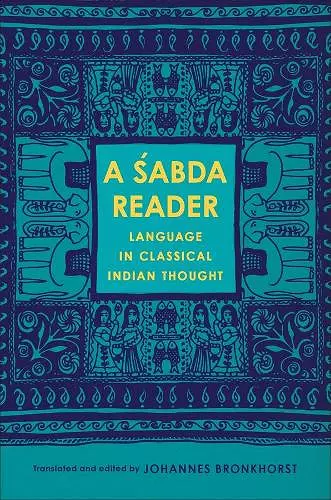A Śabda Reader
Language in Classical Indian Thought
Format:Hardback
Publisher:Columbia University Press
Published:12th Apr '19
Should be back in stock very soon

A Śabda Reader is an essential resource that explores the role of language in classical Indian philosophy. This groundbreaking work compiles newly translated excerpts from a diverse array of authors across different traditions, including Brahmin, Buddhist, and Jaina thinkers, each representing various philosophical schools. The book highlights the often-overlooked significance of language, or śabda, in the development of Indian philosophical thought.
Central to the discussions in A Śabda Reader are the foundational questions surrounding the nature of language and its relationship to reality. The text delves into how Brahmanical scholars interpreted the Veda and viewed Sanskrit, while also examining Buddhist perspectives on language's connection to the phenomenal world. Additionally, it addresses Jaina conceptions of language as a material entity, the implications of self-contradictory sentences, and the influence of words on thought processes. These insights reveal that the assumptions and implicit beliefs about language can be as impactful as the explicit theories presented by these thinkers.
The volume is not only a collection of texts but also includes an introduction that situates these ideas within their historical and cultural contexts. By doing so, A Śabda Reader illuminates a crucial aspect of classical Indian philosophy, enhancing our understanding of the philosophy of language. This comprehensive treatment makes it a valuable resource for anyone interested in the intricate relationship between language and thought in Indian philosophical traditions.
Johannes Bronkhorst is a master of the field of Indian theories of language, and he brings his lifelong expertise to provide comprehensive coverage and lucid access to scientific thinking about language from Sanskrit classics including traditions of Sanskrit grammarians, Buddhist and Jain philosophers, Yoga, Vedānta, Mīmāṃsā, Hindu logicians, and Sanskrit poetics. A Śabda Reader is going to become essential reading for anyone interested in Indian theories of language. -- Madhav M. Deshpande, author of The Meaning of Nouns: Semantic Theory in Classical and Medieval India
A Śabda Reader provides a comprehensive survey of what arguably was the world’s richest speculation on language and its nature. It was a direct exposure to this tradition in the eighteenth and nineteenth centuries that prompted the emergence of modern linguistics. Part I presents an overview of a wide spectrum of topics, whereas Part II lets the Indian mind speak for itself: it offers a comprehensive selection of passages translated from their originals. The lucid nature of the exposition makes the contents easily accessible to nonspecialists and highly informative to specialists trained in South Asian languages. -- Piotr Balcerowicz, author of Early Asceticism in India: Ājīvikism and Jainism
Never before has Indian philosophy of language been made accessible in such comprehensive, penetrating, and masterly fashion. Containing an original selection and careful translation of passages from around fifty different texts in Sanskrit, Vedic, and Pali, A Śabda Reader is an indispensable guide and sourcebook for students and scholars of India’s long, rich, and dynamic intellectual history. -- Jan E.M. Houben, Professor of Sanskrit at the École Pratique des Hautes Études, PSL Université Paris
When in the Aitareya-Brāhmaṇa the goddess Vāc ('Language') says to the gods that she will take leave from them in the attempt of rescuing the stolen sacrifice, the gods were upset: 'No, you will not go: how could we do without Vāc?' In no other tradition did speculation on language have such a strong impact on philosophical thought as in premodern India. Both Brahmanical and Buddhist philosophers, in spite of their radically conflicting views on language (a marvelous reality from which we derive ultramundane and mundane knowledge for the former; a highly dangerous and deceptive tool for the latter) brilliantly contributed to its investigation. Exploring the labyrinthine world of Indian linguistic thought, led by the firm hand of Johannes Bronkhorst, means entering Indian philosophy as a whole through the main door. -- Raffaele Torella, author of The Philosophical Traditions of India: An Appraisal
A valuable resource for a wide range of readers from non-Indological philosophers of language to Sanskrit specialists. * Bulletin de l'École française d'Extrême-Orient *
Showcases the centrality of language in Indian thought across a truly staggering range of intellectual traditions. The diversity of its selections, in terms of style and length, is one of its strengths, and it will certainly inspire its readers, whatever their level of expertise, to deepen and broaden their encounter with Indian thought about language. * Philosophy East and West *
A volume of high scholarly value with an obviously didactic slant, its functionality further enhanced by a fine selection of elegantly translated texts, represents a seminal tool for any scholar or student interested in the philosophy of language. * Cracow Indological Studies *
ISBN: 9780231189408
Dimensions: unknown
Weight: unknown
376 pages